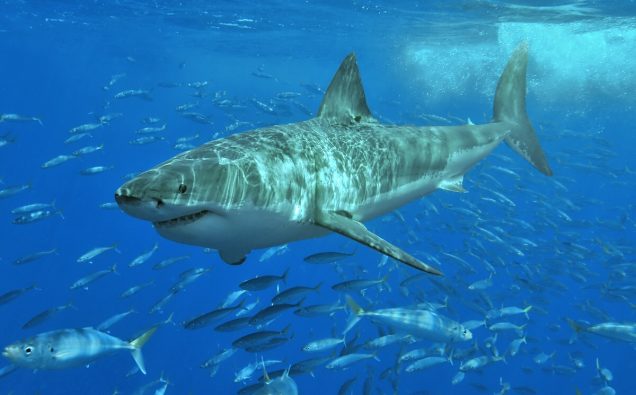
A White Shark and other fish, Photo by Terry Goss via Wikimedia Commons
Fishing on an unprecedented large scale needs to be restrained in order to produce healthy catch and bring additional billions to the developing countries.
An updated study released by the Wold Bank says in order to ramp up food security, the world needs to give oceans a break.
The report says fishing less, and better, could generate an additional $83 billion each year for the fisheries sector.
The Sunken Billions Revisited, an update on a 2009 study, shows that reducing the global fishing effort would allow fish stocks to recover from overexploitation and lead to increases in the weight, value and price of fish landed, boosting the profitability of the fisheries sector from an estimated $3 billion a year to $86 billion, the Bank said this week.
Reducing the global fishing levels would lead to more fish being caught and landed, because stocks would have recovered to healthier levels, thus helping meet growing global demand for seafood and improving food security in many countries around the world.
“This study confirms what we have seen in different country contexts: Giving the oceans a break pays off,” said Laura Tuck, World Bank Vice President for Sustainable Development.
“Moving toward more sustainable fisheries management, through approaches that are tailored to local conditions, can yield significant benefits for food security, poverty reduction and long-term growth.”
According to the Bank, the bio-economic model used in The Sunken Billions Revisited,—developed by Ragnar Arnason, professor in the Faculty of Economics at the University of Iceland—treats the world’s marine fisheries as one large fishery.
The study examines the mismatch between the increasingly high level of effort put into fishing and stagnant or even declining fish catches, and calculates the incremental benefits that could be derived from global fisheries reform.
Moreover, the analysis reveals foregone economic benefits of about $83 billion in 2012, compared with what could be generated under the optimal scenario. This result is not statistically different from the sunken billions estimated for 2004, which were revised from an estimated $50 billion in the 2009 study to $88 billion in The Sunken Billions Revisited, based on improvements in the model, better data, and adjustment to 2012 dollars.
Both figures emphasize the urgent need for reform and the important economic gains that could be made through a more sustainable management of the world’s fisheries.
Interestingly, the study does not prescribe a particular reform path. Reform experiences in countries and regions as diverse as Peru, Morocco, the Pacific Islands and West Africa show it is possible to reduce overfishing through locally appropriate reforms that ultimately improve the livelihoods and job security of coastal populations, the Bank says.
Explaining the process of recoverry, the Bank said in a news release that reducing the global fishing effort would allow biological processes to reverse the long-term decline in fish stocks seen in many parts of the world.
A startling finding says as much as 90 percent of marine fisheries monitored by the Food and Agriculture Organization (FAO) are fully fished or overfished, up from about 75 percent in 2005. Fish stocks are also under pressure from pollution, coastal development, and the impacts of climate change.
The World Bank says it helps countries improve the management of their fisheries, invest in sustainable aquaculture, and manage competing pressures on coasts and oceans, to improve the livelihoods of coastal communities and put growth on a more sustainable and resilient footing.
But will those in the business of fishing with little or no regard for the oceans, or quality of the catch, listen?
















